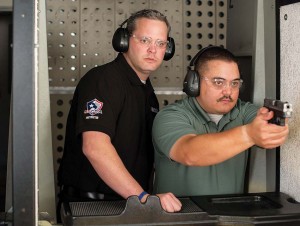by Richard Smith | Director, SAFTD
We are all students, no matter our level of experience, how long we’ve been shooting, any special training or background…we never stop learning. For many of us the formal training we take varies with time and budget, both precious resources. So, if you are going to pay someone to teach you, you want to get the most benefit from the experience. Following are some key points to help you find the right instructor, and the right class, for you. Don’t hesitate to interview the prospective instructor and ask questions. An instructor who won’t talk to you doesn’t deserve your business.
First, what is your objective, what do you want to get out of the training? Are you a new shooter looking for the basic introduction? Do you want to work on your marksmanship? Do you want to refresh your fundamentals? Are you an experienced shooter who wants to compete or take defensive tactics? All perfect reasons to look for a class and knowing your objective will help get you to the right class and the right instructor.
Finding the right combination of course and instructor is something of a “Chicken and Egg” situation. You can start with one or the other, but in the end, both should meet your objective.
Is this instructor the right fit for you? Unfortunately, anyone can call themselves a “firearms instructor,” and there are a lot of law enforcement officers, former military members, as well as people who picked up shooting on their own, who do. However, for those without specialized instructor training, their point of view may be quite different. For example, military tactics don’t really work so well for a civilian on Main Street. So, it is important for your safety to ask questions:
- What is his or her shooting background?
- What is their instructor education? Have they had formal training to teach?
- Are they certified, by a recognized entity such as the Second Amendment Foundation Training Division or the NRA, to teach the content or course you are interested in?
- Do they understand the basic laws in your geographic area? This can be important if you are planning to get a Concealed Carry Permit or taking advanced defensive training. You need a conceptual understanding of circumstances and risks of drawing your firearm.
- Do they have a “company,” often an LLC?
- Do they have liability insurance? This is a pretty good indicator of the professionalism of the trainer. They take what they do seriously.
Think about it. You probably wouldn’t hire a contractor to build you a deck without checking that they have a license and insurance. A gun class with an untrained instructor is potentially dangerous!
Look at the course description for any class you are considering:
- How does is match your objective? Can you expect to learn what you want to learn?
- Is it at the right level for you? A new shooter taking an advanced class will get frustrated and it could be risky if they try to do things that are beyond their skill level. Conversely, an experienced shooter who takes a beginner level class may be bored, unless the goal is to reset the fundamentals.
- Is the time and cost realistic for you? Most instructors require a deposit or full payment in advance, and some have very strict refund policies.
If there is any doubt, ask questions of the instructor. It is ok to take a class that is a stretch for you, but not a good idea to take one that is significantly beyond your level of comfort or skill.
It is important to remember that you don’t know what you don’t know. That also applies to your instructor. Someone without formal training may not understand the local laws and be teaching you a tactic that could land you in jail if you use it.
There are a lot of classes offered that include buzz words like “Combat” or “Tactical” in the course name. Many of these can be fun, and if that is what you want to do, they are out there. But it is important to be able to separate the hype from the reality. Just because a course is offered doesn’t mean that everything you learn will apply in the real world.
Given all of this, finding a good instructor can be daunting. Ask around. Check the boards at your local range. Visit SAFTD.com to find a list of qualified instructors.
No matter what your training goals are, this is your time, your money and your safety. Don’t hesitate to ask questions before you sign up for a class. A good instructor will welcome your questions because it lets them know you are a serious student and quality is important to you.




